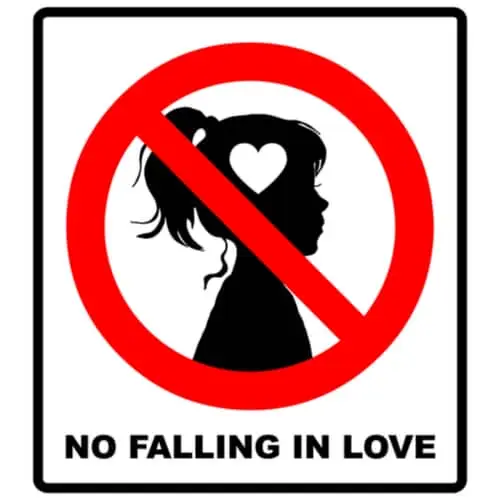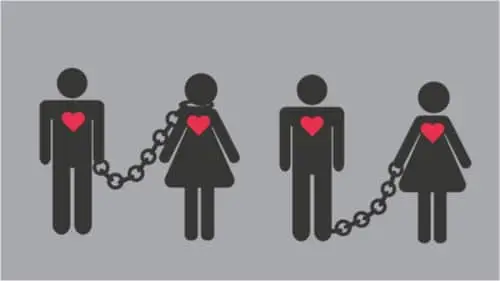It’s not uncommon to have difficulty deciding what clothes to wear, what food to eat, or other small choices. However, when you start to have difficulty committing to bigger decisions, there might be something more going on.
Commitment phobia is a common issue that plagues many people and that can cause problems in your relationships, career, and daily life. And, when not properly addressed, it can start to seriously impact your future, too.
If you or a loved one is struggling with commitment phobia, this guide is for you. Let’s take a deep dive into commitment problems, why they happen, and how to know if you’re struggling with them.
What is commitment phobia?
Before we go any deeper into commitment phobia, let’s stop and take a look at what commitment phobia actually is. This condition is actually fairly complex and has a lot of moving parts.
Commitment phobia refers to a general fear of commitment. Typically, this is associated with romantic relationships, but that’s not the only way that commitment phobia can surface. It can also include a fear of committing to a job or a reluctance to have deep friendships.

While there’s nothing wrong with keeping your options open or taking your time to make decisions when it starts to cause harm to others or to sabotage your own wellbeing it’s time to get professional assistance.
What causes commitment phobia?
Now that we have a better understanding of what commitment phobia is, let’s take a look at a few reasons why you might have commitment phobia. The cause will vary from person to person and there may be more than one reason for someone to have commitment phobia.

One common reason why people struggle with commitment is due to trauma and PTSD. People who have had negative relationships or abusive relationships in the past may be less willing to commit to a long-term relationship in the future.
Additionally, childhood experiences can influence how easy it is for someone to commit in the future. When children have parents who are either overbearing or unresponsive, they may grow up to develop issues with emotional dependence.
Finally, our culture may have something to do with the rise of commitment phobia, too. Thanks to technology and recent cultural trends, more job and relationship opportunities are available to people. The abundance of choices can make it hard for people to commit to one person or workplace.
Interestingly enough, studies have shown that Generation Xers are far less likely to commit to a workplace than Baby Boomers. They are also more likely to leave a workplace than Baby Boomers.
What are some common commitment phobia signs?
Now that we understand what commitment phobia is, let’s talk about a few common signs that you are struggling with this issue. Knowing what typical fear of commitment signs are will help you to determine whether a therapist or counselor could be beneficial to your situation.
- You avoid serious relationships

Some people prefer to date casually than to have a serious relationship. This could be for various reasons or it could be for one single reason.
While it’s fine to want to date casually, things start to get hairy if you immediately want out of the relationship once things start to get serious. This is especially true if you like the person that you’re seeing.
- You don’t plan a future in your relationship
Another sign that you’re struggling with commitment phobia is if you don’t think about a long-term future with your current partner. It’s fine to enjoy the present with your partner, but at some point, you should think about whether or not this is a good long-term fit.
If you find yourself shying away from the thought of a future with your partner or feeling unwilling to think about the next stage, there’s a good chance you’ve got a fear of commitment. This is even more true if this tends to be a pattern of yours.
- You spend a lot of time questioning things
Whether it’s in a romantic relationship, a friendship, or a job, questioning how things are going is another sign that you might be struggling with commitment phobia. Even if you are enjoying your relationship or job, you find yourself asking questions such as:

- “What’s next?”
- “Am I ready for this?”
- “Does my partner really love me?”
- “Do I want things to succeed?”
It’s normal for you to ask questions from time to time. However, if you find yourself constantly battling with your feelings and these questions, things start to get more serious.
When constant questioning begins to interfere with your job or relationship or to cause emotional upset, it’s a sign that you’re dealing with commitment phobia.
- You avoid making plans
Do you have trouble committing to plans for the weekend? Do you find yourself offering up vague responses such as “I’ll let you know” or “Let me get back to you” when people invite you to do things?
Or, does thinking about the plans that you have cause you stress? Do you feel as though you want to cancel your plans just to avoid stress and anxiety?
Sometimes we avoid making plans because we’re not actually interested in the person we’re going to spend time with. That’s especially true if you’re holding out for a better option.
However, when you really enjoy spending time with a person and still struggle with anxiety surrounding making plans, something bigger might be going on. With commitment phobia, you may struggle to make plans even though you know you will enjoy them when you get there.
- You feel emotionally unattached
If you’re in a strong, healthy relationship that you want to continue, you’re more likely to put in the effort to make the relationship last. When you do so, you demonstrate to your partner that you are committed to the relationship.
This is an important part of reassuring your partner that you want to be with them and that they don’t need to fear losing you. It can relieve feelings of anxiety about the future and help secure your attachment.

However, if you don’t feel emotionally attached to your partner, you probably won’t care a whole lot if you lose them. You’re content living your own life and aren’t bothered by the thought that one day your current partner might not be in it.
Sometimes a lack of emotional connection just means that you and your partner aren’t the best match. However, if you want a long-term relationship but struggle to connect emotionally with your partners, commitment phobia could be to blame.
- You have certain speech habits
One thing that many people with commitment phobia have in common is that they tend to use language that skirts around commitment. They may use certain words more and omit others from their speech completely.
For example, people who are afraid of commitment often avoid terms such as “love.” They also may steer away from labels, preferring to keep things casual and “go with the flow.”
On top of that, commitment phobes tend to use modifiers. Words such as “probably,” “maybe,” and “might” pepper their speech. While these words might seem innocuous, what they’re actually doing is showing hesitation to commit.
- You feel trapped
If the idea of getting married or hearing your partner say “I love you” for the first time leaves you squirming in your seat, you might be struggling with a fear of commitment. These types of demonstrations of love should have you feeling secure and happy.
However, if you find yourself feeling trapped, anxious, and backed into a corner, you’re probably scared of commitment. This can cause you to want to try to get out of the relationship, even if you really love the person and want to be with them.

- Following a script for failure
When people struggling with commitment phobia start a new relationship, they usually do so with the preconception that the relationship will fail. They don’t plan on the relationship working out but instead assume that things will fail right off the bat.
What that means most of the time is that the relationship ends up being a self-fulfilling prophecy. Because the person doesn’t expect the relationship to work out, they end up self-sabotaging their chances with someone they really love.
- You don’t have a lot of close friends
While we often tie commitment phobia to romantic relationships, the reality is that this issue can rear its head in friendships and business relationships too. When you struggle with commitment phobia, it can be tough for you to form deep, meaningful relationships with others. Instead, you might have small social groups or superficial relationships.

On top of that, if you don’t have a long romantic history, there could be a chance that you’re not ready to commit. A fling here and there isn’t a red flag, but if you’ve never had a serious relationship, you might want to examine whether or not this is due to a fear of committing.
- You only focus on yourself
Part of having a healthy relationship means making sacrifices from time to time. These could be sacrifices that benefit your partner or sacrifices that benefit the relationship as a whole.
However, if you find it hard to put your partner first or to use words such as “we” and “us,” you may have a commitment phobia. You might find that you are running away from making a long-term commitment to the future of your relationship and so are instead using self-centered behavior.
How do I overcome commitment phobia?
If the above signs of commitment phobia seem to describe your situation all too well, you’re probably dealing with commitment phobia. While this can seem like a scary place to be, there are plenty of options available to you for overcoming your struggles.
- Talk to a Makin Wellness therapist

Whether you choose to commit to individual counseling sessions or couples counseling sessions, speaking with a therapist can work wonders. It’s a great place for you to look within yourself and see why commitment is such a struggle for you.
In an individual therapy session, you may look at childhood traumas, attachment styles, and other factors that could be affecting your ability to commit. In couples therapy, you and your partner can learn to navigate the challenges of commitment phobia and build a stronger connection.
- Talk things out
One of the simplest yet most effective ways to overcome commitment phobia is to simply be honest with yourself and with your partner. By putting a name to your fear, you can learn to feel better about what’s going on and address what might be causing your issues.
When talking with your partner, be sure to be specific. Let them know what it is that causes you so much anxiety and why you are so afraid of committing to anything serious.
- Practice, practice, practice
Just like you’d practice playing an instrument that you want to get better at, practicing commitment can help you to improve at that, too. When you develop a habit of committing to small things, it will start to feel more natural to commit to more long-term habits.
Start by taking baby steps. Commit to Friday night dates or to other small activities that can help you slowly adjust to making larger, more serious commitments.
Get ahead of commitment phobia
With this step-by-step guide, it’s easy to understand whether or not commitment phobia is an issue for you or a loved one. And, if it is, you need to get treatment so that you can lead a healthy and balanced life again.
Luckily, the team at Makin Wellness can help. Start the process of moving forward from commitment phobia with Pennsylvania online therapy at Makin Wellness. We serve the Greater Pittsburgh, PA area, the Philidelphia, PA region, and the entire state of Pennsylvania. To learn more about how we can help you start your healing journey now.









This Post Has 8 Comments
I have not a doubt in my mind that I struggle with commitment issues, ever since I got my heart shattered in a break up of five years, I have not fully been able to commit to being with another person. I always thought that maybe it was because I missed the person that I was with, but now I realize that I cannot even see a future with them anymore, I am starting to see a problem. I have been out of constant flings and one month relationships because I constantly end things when I see them getting too serious. I continue to hurt people over and over again trying to make myself happy and I am starting to feel like I am a horrible person when I know deep down that I have a kind heart and I am just trying to be happy.
Hi Madison. We are sorry that you are struggling with commitment issues. Feel free to schedule an appointment with one our team members to help you move toward healing.
So I no longer want to date…. that’s no longer an issue…. I struggle to commit to anything other then work. If I make plans , I feel them looming up, I get complete anxiety and don’t want to go. I end up letting people down and feel horrible about it. I don’t like anyone getting too close/ clingy . I can only live in the day and see what it brings. Only found out this condition exists today but I reckon I’ve had it for years
I know right? Its the worst. I’m also struggling with the same.. always looking for ways out in relationship. I’m always seeing what they didn’t do as an excuse to get out of the relationship when really all I want to do is be alone.
I have signs of continent phobia yet not with a person but with my life specifically where to build a life. I just don’t know where home is to be for me anymore. I have been battling this for 9 years. I saw a therapist this week for first time. It was she who raised this term of commitment phobia and so much resonates with me. I am plagued from making plans and am and have just been drifting through life I can’t continue like this and want to have a strong direction and goals in my life not to just get through another day.
This is a great blog post! I have been struggling with commitment phobia for a while now and this article has really helped me understand what is going on and how to deal with it. Thank you for writing it!
Die another day! Live in the now. Tomorrow never comes so now is your best moment, seize it.
Commit only to the moment. Leave yesterday in the past.
Live now, love now, open your heart now. Don’t be afraid to live, to love, to share, to care!
Trust God to take care of everything. Lean on Him, accept His unfailing love!
Jesus loves you, He died to set you free from all fear, and He rose again in power. He wants you to live an abundant life, now and eternally.
By Oluremi J O
24 November 2022, 16.20 Hrs GMT
Pingback: COMMITMENT PHOBIA WORKSHEET - HappierTHERAPY